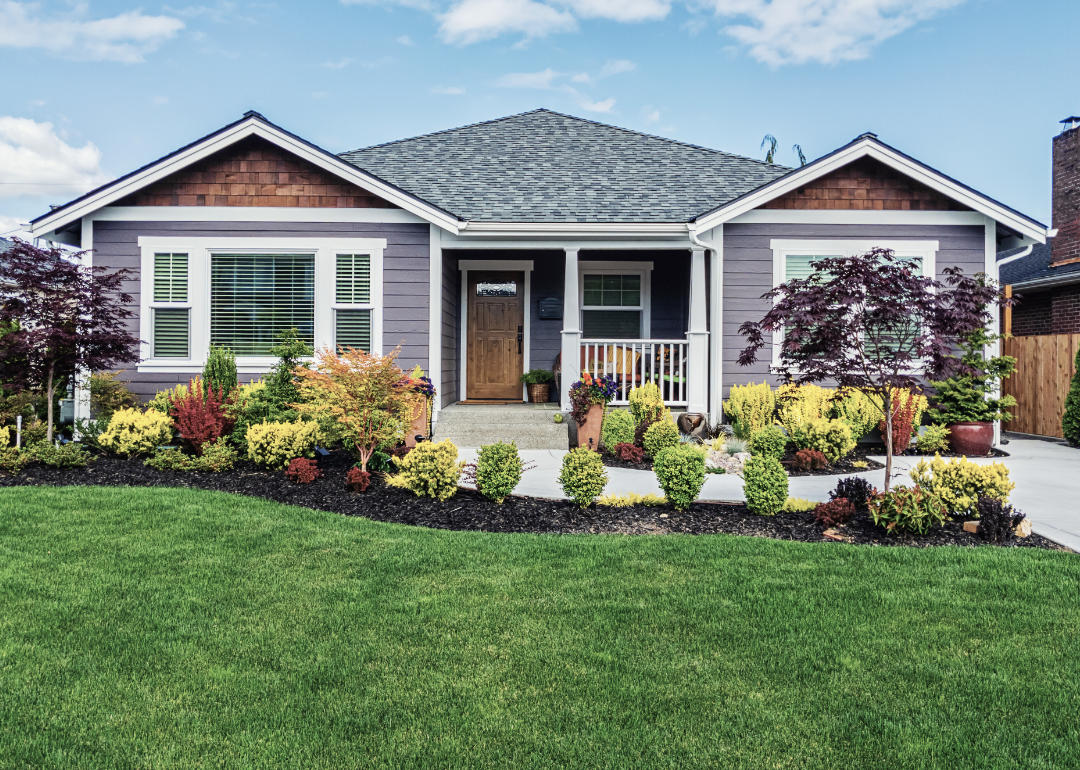5 simple ways to get back on track with your mortgage payments

Canva
5 simple ways to get back on track with your mortgage payments
Exterior of a small home with detailed landscaping.
If you’re feeling the stress of high housing payments, you’re not alone. More than 60% of Americans are stressed by high housing prices and 39% have said they’re skipping meals to afford housing costs, according to a new survey by Clever Real Estate.
The impact of home costs is hitting millennials hardest, with 44% saying they’re missing breakfast, lunch or dinner just to make their home payments.
That generation isn’t just cutting back, the survey found that 50% are working overtime and taking on extra jobs just to make home ownership a reality.
With the high cost of living and increasing interest rates, it’s no surprise that so many Americans are feeling extra stress when it comes to their home finances.
If home payments are causing anxiety, headaches or even hunger, Moneywise has compiled five simple things you can do to help you get back on track.
Refinance your mortgage
While interest rates have been increasing steadily over the past year, you may still be able to reduce your monthly payments by refinancing.
For example, if you first took out a loan in 2008, there’s a chance that your mortgage rate is higher than today’s rates. By refinancing, you might be able to lock into slightly lower rates which will save you money each month.
Likewise, if your credit score has improved since you first took out a mortgage, you may now qualify for a lower rate. Be sure to speak with your mortgage lender to see if they can re-evaluate your credit score and offer you better loan terms
You might also consider refinancing your mortgage if you’re looking to get a shorter term, or want to change your mortgage type from an adjustable rate mortgage (ARM) to a fixed-rate one.
While historically ARMs have offered a cheaper interest rate, fixed-rate mortgages provide stability and predictability when it comes to payments.
![]()

Canva
Set up automatic payments
A person in a brown sweater works on a laptop.
When you miss a mortgage payment, the best case scenario is that you owe late penalties. In the worst case, you might see your credit score drop or end up with your home in foreclosure.
Of course, there’s a few steps in between missing a payment and losing your home, but late fees can wreck an already tight budget. Typically, you have a 15 day grace period to catch up on missed payments. When you’re 30 days late (or don’t pay at all), your mortgage lender will report it to the credit bureaus, and your credit score will be damaged.
A no-brainer way to make sure you never miss a payment is by setting up automatic payments. While you have to make sure the cash is in your account, the stress of remembering to pay your mortgage will be lifted from your shoulders.
Downsize your home
If you’re finding your house payments unmanageable, it might be time to consider a smaller home.
While there are costs associated with buying a home and moving, a less expensive home means a smaller mortgage and money saved in the long term.
A smaller home can also save you money on monthly costs like heating and electricity. A smaller home might mean less maintenance costs, which 47% of homeowners find causes them anxiety and stress.
If downsizing isn’t in the cards, it is worth considering using your extra space to boost your monthly income. You could become a landlord by renting out part of your home, or you make use of one of your unused bedrooms as a short-term guest rental on a platform like AirBnB.

Canva
Look into a forbearance plan
A handshake over a desk in an office setting.
Forbearance is when you temporarily pause or reduce your mortgage payments. This can let you get your finances on track without affecting your payments in a substantial way.
Most mortgage lenders don’t charge additional fees or penalties for forbearance, nor will they charge additional interest.
It’s important to note that forbearance doesn’t mean your mortgage payments are eliminated. You’ll have to repay these missed payments according to the terms laid out by your lender.
For most people, forbearance is temporary. According to the Risk Assessment, Data Analysis, and Research (RADAR) Group, less than 5% of mortgages who entered forbearance since the start of the pandemic are still in it.
Make a budget and stay within it
Inflation has eaten away at everyone’s living expenses, which is why four out of five Americans say they are stressed by the cost of living according to Clever Real Estate’s survey. Even if you think you have a handle on your spending, the rising costs of food and essentials means your paycheck isn’t going as far as it used to.
Knowing where your money is going is a key step to easing the burden of house payments. If you don’t already have a budget, take time to create one. Lay out all your expenses on a spreadsheet and see how much income you have each month, and how much you’re spending.
Once you have a balanced budget, stick to it. You may discover that you can free up some money by trimming away at some of your non-essential expenses.
For instance, if you lower the temperature on your water heater, you can cut back on energy costs. Similarly, doing your laundry and running other big appliances at night when energy is typically less expensive can save you on your hydro bill. You can also try installing smart outlets throughout your home to reduce electricity expenses. Every penny counts, especially when your dinner is on the line.
This story was produced by Moneywise and reviewed and distributed by Stacker Media.